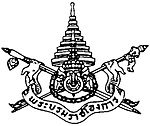Translation:Act on Application of Islamic Law in the Provinces of Pattani, Narathiwat, Yala and Satun, BE 2489 (1946)

Act
on Application of Islamic Law in the Provinces of Pattani,
Narathiwat, Yala and Satun,
BE 2489 (1946)
In the Name of Somdet Phra Chao Yu Hua Bhumibol Adulyadej,
The Council of Regency:
Rangsit Kromma Khun Chainatnarenthon.
Phraya Manawaratchasewi.
Given under our Hands this 19th Day of November, BE 2489 (1946);
Being the 1st Year of the Present Reign.
Whereas it is desirable to require the courts of first instance in the Provinces of Pattani, Narathiwat, Yala and Satun to apply the Islamic Law to the actions involving Islamic family and succession in which both the plaintiffs and the defendants are Muslim or, if the actions are non-contentious, the petitioners are Muslim;
Be it enacted by the King's most Excellent Majesty, by and with the advice and consent of the National Assembly, as follows:
§ 1
This Act shall be cited as the "Act on Application of Islamic Law in the Provinces of Pattani, Narathiwat, Yala and Satun, BE 2489 (1946)".
§ 2
This Act shall come into force as from the day following the date of its publication in the Government Gazette.[1]
§ 3
When addressing an action involving Islamic family or succession in which both the plaintiff and the defendant are Muslim or, if the action is non-contentious, the petitioner is Muslim, a court of first instance in the Province of Pattani, Narathiwat, Yala or Satun shall adhere to the Islamic Law on family and succession in lieu of the pertinent provisions of the Civil and Commercial Code, save those governing succession prescriptions, whether the cause of action comes to pass prior to or following the coming into force of this Act.
§ 4
When addressing the action under section 3, the chamber of the court of first instance shall consist of one qāḍī and other judges.
The qāḍī shall be competent to decide the questions of Islamic laws and to sign the judgments adopted in pursuance of his decisions.
The decisions of a qāḍī on the questions of Islamic laws in any action shall be final with respect to that action.
§ 5
The provisions of the Code of Civil Procedure on challenge to judges shall apply mutatis mutandis to the qāḍīs.
Where the qāḍī is incapable of functioning, the parties shall, by agreement, select one Muslim to serve as a qāḍī ad litem. If such agreement cannot be reached, each party shall nominate to the chief judge of the court the equal number of the appropriate Muslims; prescribed that no party may nominate more than three Muslims. Any one of these nominees who has been selected by the chief judge shall then become the qāḍī ad litem.
§ 6
The provisions of this Act shall not affect the actions pending before the courts on the date of coming into force of this Act. But when, in respect of any action pending before a court of first instance, the parties or, if the action is non-contentious, the petitioners, as the case may be, requests the court to apply the provisions of this Act, such court shall direct the complaint or petition to be resubmitted and the proceedings to be continued in accordance with this Act, said the request being made within thirty days from the coming into force of this Act.
§ 7
The Minister of Justice shall be in charge of this Act.
- Countersigned by:
- Rear Admiral T. Thamrongnawasawat,
- Prime Minister.
Footnotes[edit]
- ↑ Published in the Government Gazette: volume 63/part 77/page 633/3 December 1946.
![]()
![]() This work is a translation and has a separate copyright status to the applicable copyright protections of the original content.
This work is a translation and has a separate copyright status to the applicable copyright protections of the original content.
| Original: |
This work is in the public domain worldwide because it originated in Thailand and is a work under Template error: please specify the type of this work (see template documentation) of Thailand's Copyright Act, 2537 BE (1994) (WIPO translation), which provides:
Public domainPublic domainfalsefalse |
|---|---|
| Translation: |
Released into public the domain I agree to release my text and image contributions, unless otherwise stated, into the public domain. Please be aware that other contributors might not do the same, so if you want to use my contributions under public domain terms, please check the multi-licensing guide.
Public domainPublic domainfalsefalse |